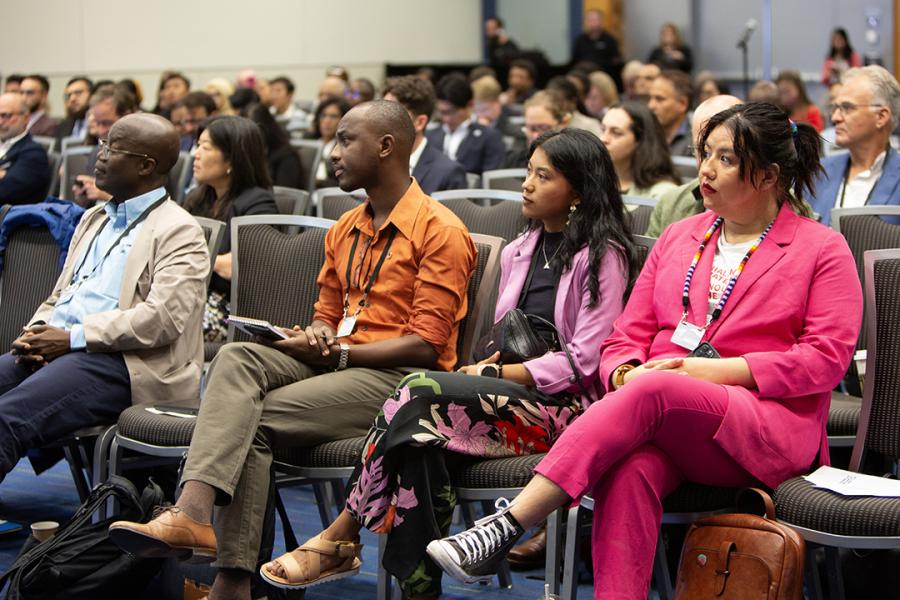As unprecedented and catastrophic wildfires rage across the globe, the 7th Assembly of the Global Environment Facility (GEF) has taken a historic decision by ratifying the creation and initial funding of the Global Biodiversity Framework Fund (GBFF), Avaaz welcomes this approval and calls on the GEF to remove the ‘aspirational’ intention by effectively and urgently directing the 20% share of the GBFF to Indigenous Peoples as a fixed funding target.
Furthermore, as per the GEF Council Decision that was adopted in June and ratified today (Thursday) by the Assembly, initial contributions for the GBF Fund are set at $200 million from at least three donors by December 2023 in accordance with the World Bank Directive on Financial Intermediary Funds.
Avaaz commends Canada’s 200 million CAD and the UK’s 10 million GBP commitments, but also points out that 40 million USD is still needed to operationalize the fund by the end of 2023. Avaaz also urges governments that have taken the floor today to announce they would support this effort, including Japan and the US, to “put money on the table”, and as urgently as they mentioned in their interventions.
In a letter to the Chair of GEF Assembly, the Hon. Ahmed Hussen (Minister of International Development of Canada), Avaaz called on the Assembly to ensure direct access to funding for Indigenous Peoples, and as the GEF’s maximum decision-making body to develop a clear path of action for the GEF Secretariat and the Council in its 65th meeting in December. This is of importance as the Assembly will convene only once more before the 2030 deadline for the Kunming-Montreal Global Biodiversity Framework targets to be implemented -only 7 short years are at the world’s disposal to make a paradigm change.
Reacting to the GEF Assembly decision, Oscar Soria, Avaaz campaign director, said: “The time for half-measures has passed; now is the moment to confront this crisis head-on. The GEF must rise to this moment of urgency by ensuring robust and direct financial support to empower IPLCs in their critical roles and efforts, and by prioritizing indigenous-led ecosystem management strategies with the necessary financial resources to continue protecting our planet. Surely donors can come up with the paltry 40 million dollars needed to operationalize the GBF Fund today.”
With wildfires wreaking havoc in British Columbia, where the meeting is taking place, but also in many other areas around the world, like Hawaii, the Amazon and the Congo basin, Avaaz stressed the pivotal role of Indigenous Peoples in safeguarding biodiversity and preventing environmental contingencies such as wildfires.
Colombian Indigenous leader Dario Jose Mejia Montalvo, Chair of UN Permanent Forum on Indigenous Issues (UNPFII), said: “Indigenous peoples have a close relationship with their territories, based on their integral knowledge systems. Their territories are the least degraded, but at the same time they are the most threatened, including by fires caused by human action, directly or indirectly. This is an opportunity for the GEF Assembly to rectify historical injustices and provide the necessary financial support for indigenous peoples to strengthen their leadership in the fight against major environmental challenges, including forest fires”.
The GEF’s mandate to align efforts across conventions is now more critical than ever: GEF must ensure that indigenous knowledge and practices are at the heart of all programming decisions. Only by fully integrating indigenous-led strategies can we hope to address the escalating environmental crises. Indigenous communities, with their generations of land stewardship and fire management expertise, hold the key to preventing catastrophic wildfires and other environmental contingencies. Yet, despite their unparalleled understanding, they continue to be underfunded and overlooked.
The fires in Canada’s British Columbia and around the world serve as stark reminders of the urgency of this matter. Human lives and livelihoods are being lost or endangered, ecosystems are being decimated, wildlife habitats destroyed, and cultural heritage threatened. These wildfires are not isolated incidents, and as the backdrop of the Assembly, they highlight a global catastrophe that demands a united response by all.
Avaaz says it welcomes the 7th GEF Assembly on ratifying the GBF Fund, and requests the GEF Council in its 65th Meeting to take the following measures:
* Ensure immediate Funding: Allocate urgent financial resources to empower Indigenous Peoples to execute effective environmental management practices, a key measure to prevent and tackle wildfires and other environmental crises. These communities are on the frontlines, and their expertise must be harnessed to prevent further devastation.
* Direct Indigenous Involvement: Facilitate direct involvement of Indigenous Peoples in policy-making, ensuring their traditional knowledge shapes conservation and sustainable use strategies in support of the targets of the Kunming-Montreal Global Biodiversity Framework.
* Global Emergency Response: Establish a rapid-response mechanism to address emerging wildfire crises, allowing Indigenous peoples to take the lead in managing and mitigating disasters such as the devastating wildfires currently threatening the globe.
* Private Sector Accountability: Enforce private sector accountability for preventing environmental degradation and its diverse manifestations such as wildfires, in particular agribusiness and commodities sectors, and that these sectors recognize and support the critical role that Indigenous-led efforts play in protecting our planet.

Avaaz emphasizes that the 7th GEF Assembly represents a turning point in the way GEF can renew and respond to what its CEO Carlos Manuel Rodríguez recognizes as a mostly static response by international development finance to the new environmental challenges that the world, and especially developing countries and the most vulnerable populations are facing: IPLCs bear the brunt of environmental disasters that are largely the result of inaction and unsustainable practices and consumption patterns in the developed world. “Failure to act decisively now could lead to irreversible damage. The world is ablaze, and we must act with urgency.”
Independent News Express reports that Avaaz is a global movement uniting nearly 70 million members across nations, harnessing the potential of online connectivity to galvanize collective action, and amplifying individual voices into a potent collective force during pivotal moments, effectively addressing pressing global challenges like climate change, biodiversity loss, land degradation, human rights, and the encroachments on democratic principles.

